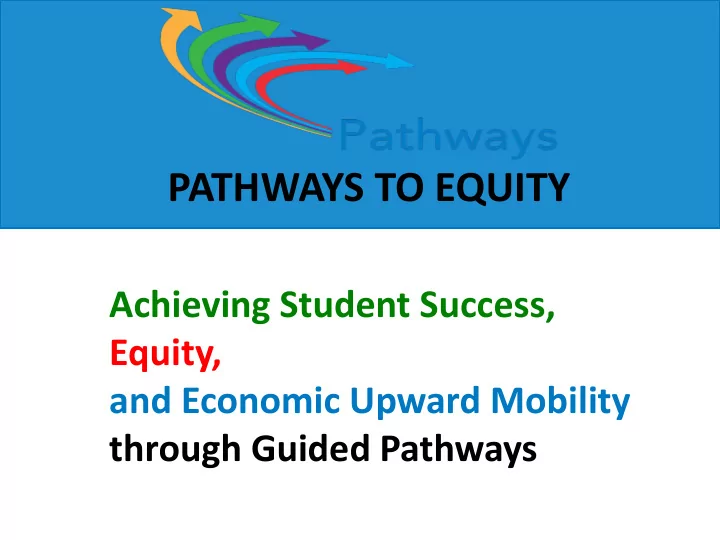

PATHWAYS TO EQUITY Achieving Student Success, Equity, and Economic Upward Mobility through Guided Pathways
Children's prospects of earning more than their parents have fallen from 90% to 50% over the past half century. Source: The Equality of Opportunity Project
Lifetime Earnings Gains by Degree Type (compared to HS only) 92% Bachelor's Degree 46% 40% Females Associates Degree Males 17% 20% Certificate 8% Source: NELS Data, Marcotte, Bailey, Borkoski, & Kienzl, 2005, p. 164-165, 170-171.
The Equality of Opportunity Project Study of intergenerational mobility in the U.S. using administrative data on 40 million children “The question of whether the U.S. is the “land of opportunity” does not have a clear answer.” Substantial variation in intergenerational mobility within the U.S. Some lands of opportunity and some lands of persistent inequality Much variation across colleges in “mobility rates” -- Source: The Equality of Opportunity Project
The Geography of Upward Mobility in America Children's Chances of Reaching Top 20% of Income Distribution Given Parents in Bottom 20% The map shows the chances of rising out of poverty to the top of the income distribution based on where children grew up. Source: The Equality of Opportunity Project
The Equality of Opportunity Project In the nation as a whole, children from the highest- income families end up 30 percentiles higher in the distribution of individual earnings on average than those from the lowest-income families. Source: The Equality of Opportunity Project
Major Decisions Along the Path ENTRY PROGRESS COMPLETION / CONNECTION From entry to passing From program entry to TRANSITION From interest to application program gatekeeper completion of program From program completion to courses requirements career advancement and further education • What are my program • Am I making progress? • What are my career • How do I transfer? options? options? • How do I get related • How do I get a job in • What are program • Which college offers work experience? my field of interest? requirements? programs in my field • What if I want to • Which program is a of interest? change majors? good fit? • How much will it cost • What if I am struggling • What will I take? and how will I pay? academically? • Will credits transfer? • How will I get the • How much time and • How much time and financial supports I money to complete? money to finish? need to be able to • What if I change my • How do I balance my attend/succeed? mind about a major? other obligations?
ACHIEVING EQUITY Won’t happen by itself. • Is accomplished through change in the educational • experience designed for students – as it incorporates the best of what we’ve learned about what matters. Requires getting well past disaggregation of data…to the • difficult work of uncovering and the addressing sources of institutional racism and unconscious bias. Equality Equity •
ACHIEVING EQUITY Reviewing processes through which we support students in • exploring options and making choices. Integrating dramatically redesigned developmental • education into pathways. Embedding academic support within courses • Attending to financial stability/collective impact •
QUESTIONS? COMMENTS? kmcclenney@aacc.nche.edu
Recommend
More recommend